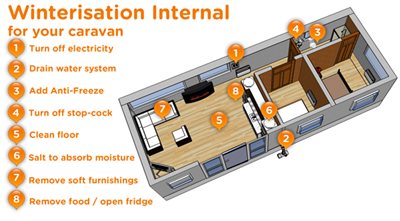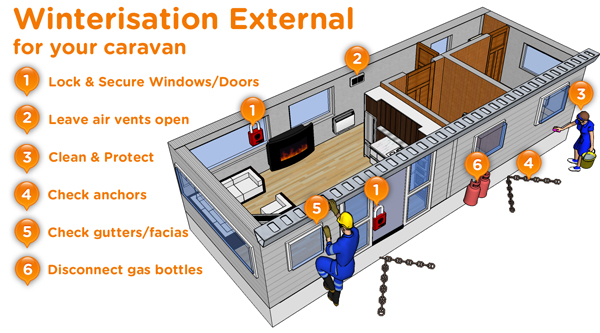Winterisation is the process of preparing your holiday caravan for the winter. While modern caravans are equipped to operate normally throughout the winter, chances are you won’t be operating it normally; chances are you won’t be using it at all.
And this is where problems arise. That lovely caravan of yours can stand up to all manner of punishment, even surviving the rigours of a two week family holiday with young children; but when it is left alone in the wilds of winter, things can go wrong.
Follow this handy guide to winterising your caravan and you can enjoy the festive period without worrying about what sort of condition your unit will be in when you return to it in spring.

Inside
The first thing you need to do is make sure that your holiday caravan is disconnected from any energy sources. If you use gas canisters with your caravan, ensure that they are disconnected and that the valves are closed. Full or part-full gas canisters should be stored in a secure and well ventilated location.
Remember that Butane can freeze even when temperatures are several degrees above zero. This does not occur with Propane. If you use mains electricity and gas, make sure both of these are turned off before you leave for the winter.
Next, completely drain the water system. Check your holiday caravan’s owner handbook and find your drain plug, turn on all the taps and let the hot and cold water systems drain completely. Drain the toilet cistern by flushing it and then pour antifreeze into the toilet bowl. Pour antifreeze into all plugholes and into any pipes to prevent residual water freezing in the system and causing damage.
With the water drained, disconnect your stopcock to prevent any water seeping in and causing damage. Stopcocks can sometimes continue to seep water even when they are closed, so disconnecting your stopcock is a sensible precaution.
Give the caravan an early spring clean, removing any soft furnishings and food as you go. This will keep the damp at bay and ensure that there are no perishable goods left to fester in your caravan over the winter.
A few bowls of salt, strategically placed around your caravan, will also help to prevent damp, as will covering all furniture and moving it into the middle of the room. Giving your fridge a thorough clean out and leaving its doors open to air will also prevent any bad odours from accumulating over the winter. Tidying up and taking precautions before you leave makes sure that your caravan is clean and fresh when you return to it in the New Year.
Ensure all windows and doors are locked tight when you leave to prevent thieves or vandals gaining access. Do not close the air vents; these have been specifically designed to be secure and will not provide an access point for unauthorised visitors, however they will eliminate damaging condensation.

Outside
While your holiday caravan is designed to stand up to whatever the British weather can throw at it, this is not a reason to get complacent. Investing in a good quality overwintering fluid protects your caravan from all manner of muck and grime that is likely to build up on its normally shiny surface over the winter.
The coating prevents algae, dirt and black marks accumulating on the caravan, while also making that preliminary clean much easier when you return in spring. Smaller caravans can be further protected with the use of a breathable protective sheet, although don’t be tempted to cut corners and use an alternative cover, such as a tarpaulin or plastic sheet. Experts warn against using non-breathable covers, stating that the condensation build-up that occurs under such covers is more damaging to a caravan than leaving it unprotected all winter.
Inspect the caravan above and below before you leave for the season. Add new flashing to roof joints and ensure that the roof is water tight. Precautions like these can avoid the hassle of having to conduct repair work later on. Don't forget to check that the anchoring beneath the caravan is secure and in good condition. Conduct a visual check on the anchoring chains to ensure no rust or corrosion has taken place and that the unit is firmly anchored to the ground.
Remember to check on your holiday caravan periodically throughout the winter, particularly after a spell of heavy weather. This gives you the opportunity to make checks on the caravan and take care of any minor repairs that may be required. Returning to the caravan over the winter also acts as an effective deterrent to would be vandals and thieves.
We really like this video from Park Holidays UK on winterisation:
www.youtube.com/watch?v=q654E6JE9Dw
